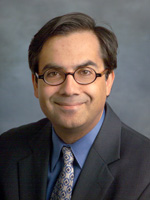Ethics: Disasters and Crisis
The Bencher—July/August 2020
John P. Ratnaswamy, Esquire
 I am writing this column while working at home during the COVID-19 crisis. The coronavirus situation likely will have changed in many ways by the time this column is published, but I believe that this is a suitable time to discuss some general legal ethics principles relating to legal practice during a crisis that interferes with the normal practice of law.
I am writing this column while working at home during the COVID-19 crisis. The coronavirus situation likely will have changed in many ways by the time this column is published, but I believe that this is a suitable time to discuss some general legal ethics principles relating to legal practice during a crisis that interferes with the normal practice of law.
Discussion of the application of legal ethics principles during a calamity is not new. In 2018, prompted by disruptions of the legal system by severe hurricanes and wildfires, the American Bar Association’s (ABA’s) Standing Committee on Ethics and Professional Responsibility issued its Formal Opinion No. 482: “Ethical Obligations Related to Disasters” (Sept. 19, 2018). The summary of the Opinion states:
The Rules of Professional Conduct apply to lawyers affected by disasters. Model Rule 1.4 (communication) requires lawyers to take reasonable steps to communicate with clients after a disaster. Model Rule 1.1 (competence) requires lawyers to develop sufficient competence in technology to meet their obligations under the Rules after a disaster. Model Rule 1.15 (safekeeping property) requires lawyers to protect trust accounts, documents, and property the lawyer is holding for clients or third parties. Model Rule 5.5 (multijurisdictional practice) limits practice by lawyers displaced by a disaster. Model Rules 7.1 through 7.3 limit lawyers’ advertising directed to and solicitation of disaster victims. By proper advance preparation and planning and taking advantage of available technology during recovery efforts, lawyers can reduce their risk of violating the Rules of Professional Conduct after a disaster.
While the Opinion arose out of extreme weather and fire scenarios, its reasoning is not limited to those forms of disaster, although the implications of lawyer and/or client illness that may arise during a pandemic are not discussed.
The ABA has updated its website resources on legal practice in and after disasters in light of the COVID-19 pandemic. As I write this column, that material may be accessed, among other ways, through these ABA webpages: www.americanbar.org/groups/committees/disaster and www.americanbar.org/advocacy/the-aba-task-force-on-legal-needs-arising-out-of-the-2020-pandem.
State bars also have addressed legal ethics during the COVID-19 pandemic. Not surprisingly, many of them also have focused on, among other things, the application of general principles of communication with clients, diligence, competence, and confidentiality, as well as the specific subjects of lawyer and client illness and use of social media. See, for example, the State Bar of Michigan’s webpage on “Ethics in the COVID-19 Pandemic,” currently at www.michbar.org/opinions/ethics/COVID-19. See also, e.g., the following page from the Virginia State Bar: www.vsb.org/site/news/item/law_practice_covid19.
Courts are adopting special procedures during the COVID-19 pandemic. Lawyers will need to be mindful of those changes if and as applicable to their specific practices.
All of that being said, we must keep in mind the human condition. A disaster places emotional strains and burdens on lawyers, staff, clients, judges, and others in the legal system, as well as the population as a whole. My most recent ethics column in The Bencher was on lawyer well-being and attorney regulation, but there are on-point resources on mental health and well-being during the COVID-19 pandemic. See, for example, the ABA’s webpage on COVID-19 Mental Health Resources, currently found at www.americanbar.org/groups/lawyer_assistance/resources/covid-19--mental-health-resources. That page provides a link to a directory of lawyer assistance program resources and offers specific links on anxiety, depression, law practice management and leadership, panic, social distancing, staying mentally healthy, stress, substance use, and suicide, as well as a special link for law students.
Let’s be careful out there, and let’s be empathic out there, too.
John Ratnaswamy, Esquire, is the founder of The Law Office of John Ratnaswamy LLC, in Chicago, Illinois. He also serves as an adjunct professor of legal ethics at the Northwestern University School of Law. Ratnaswamy served as a member of the Hearing Board of the Illinois Attorney Registration & Disciplinary Commission from March 2011 to February 2016. He is a former member of the American Bar Association’s Standing Committee on Ethics and Professional Responsibility and is the current chair of the ABA Solo, Small Firm, and General Practice Division’s Committee on Ethics and Professional Responsibility. This column should not be understood to represent the views of any of those entities or Ratnaswamy’s or the firm’s current or former clients.